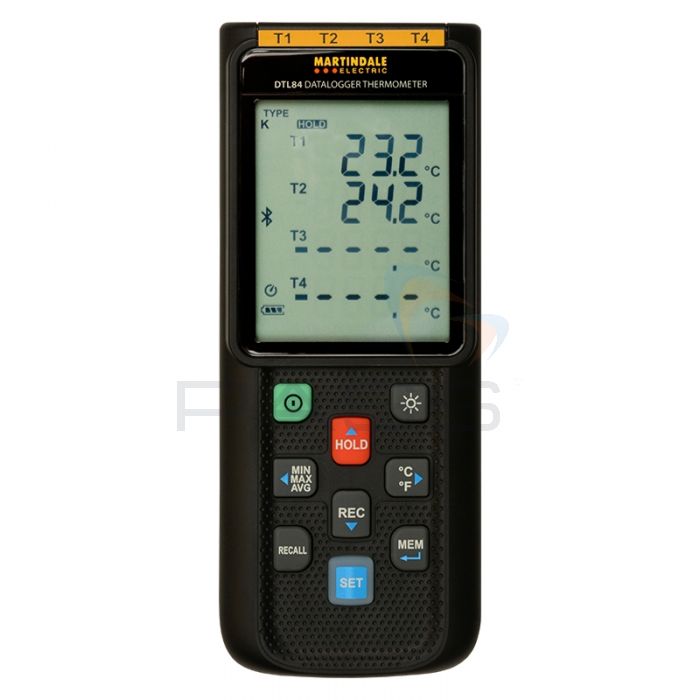Martindale DTL84 Multi-Input Datalogging Thermometer

- Temperature range: -200°C to +1700°C
- Four channels allow the thermometer to measure input and output temperatures simultaneously
- Differential mode for assessing the efficiency of heating equipment/ systems
The Martindale DTL84 Multi-Input Datalogging Thermometer can be used to measure temperatures between -200°C and 1700°C. The user is able to view temperatures in either °C or °F.
Measurements are indicated on the thermometer’s LCD display with a backlight and large digit size. The Martindale DTL84 Multi-Input Datalogging Thermometer is also supplied with a fold-away, integrated stand allowing the user to adjust the viewing angle as necessary.
Due to this datalogging thermometer’s four channels, the Martindale DTL84 can be used to measure the input and output temperatures of systems/ equipment simultaneously. The inclusion of a differential mode allows the user to measure the difference between the four readings acquired by each of the thermocouples, thereby facilitating his/her ability to assess the effectiveness of the heating equipment and/or system under investigation.
In addition to a differential mode, the Martindale DTL84 Multi-Input Datalogging Thermometer also includes measurement functions such as MIN/MAX/ AVG. This measurement function is optimised for recording over prolonged periods, therefore when this function is activated the Auto-Power-Off function is de-activated.
Further to this, the Martindale DTL84 Multi-Input Datalogging Thermometer includes an adjustable offset allowing the user to tailor the thermometer to his/her requirements via selecting the best measurement accuracy at a chosen reference temperature.
Data recorded by the Martindale DTL84 Multi-Input Datalogging Thermometer can be transferred to a PC via the supplied USB cable or Bluetooth adapter. Furthermore, these accessories, as well as the supplied data software, can be used to perform real-time monitoring and data logging. Alternatively, the user may download Martindale’s free Android/ iOS app (NOT included) from Google Play/ App Store allowing him/her to view and analyse data via his/her smartphone.
Finally, in addition to the aforementioned USB cable, Bluetooth Adapter and software, the Martindale DTL84 Multi-Input Datalogging Thermometer is supplied with two K-type thermocouples and a soft carrying case.
The Martindale DTL84 Multi-Input Datalogging Thermometer is a simple-to-use, effective and efficient instrument. Its extensive range makes it suitable for a variety of applications.
Martindale DTL84 Multi-Input Datalogging Thermometer Key Features
- Measure and record temperatures between -200°C and 1700°C
- View results in either °C or °F
- Digital display with backlight and large digit size
- Integrated, fold-away stand
- Measure the input and output temperatures of systems and/or equipment simultaneously
- Differential mode: calculate the difference between the four thermocouple readings
- Differential mode proves particularly useful when assessing the effectiveness of heating equipment/ systems
- MIN/MAX/ AVG function
- MIN/MAX/AVG function is optimised for prolonged measurement periods and so deactivates the Auto-Power-Off function
- Auto-Power-Off function
- Adjustable offset
- Supplied with a USB cable and Bluetooth adapter for transferring data to a PC
- Supplied with datalogging PC software for real-time monitoring/ data logging
- Compatible with Martindale’s free Android/ iOS app (NOT included) available through Google Play/ App Store
- Martindale’s App can be used to view and analyse data via a smartphone
- Supplied with two K-type thermocouples
- Supplied with a soft carrying case
- A simple-to-use, effective and versatile data logging thermometer
- Its extensive range makes it suitable or a variety of applications
What’s Included?
- Martindale DTL84 Multi-Input Datalogging Thermometer
- 2x K-Type Thermocouples
- Bluetooth Adapter
- Micro-USB Software
- DTL84 PC Software (on CD)
- Soft Carry Case
- Instruction Manual
Martindale DTL84 Multi-Input Datalogging Thermometer Technical Specifications
| Temperature coefficient | 0.01% of reading + 0.05°C (0.0028°F) per °C (0°C to 18°C, 28°C to 50°C or 32°F to 64°F, 82°F to 122°F) |
| Range | K: -200°C-1372°C (-328°F-2501°F) |
| J: -200°C-1000°C (-328°F-1832°F) | |
| E: -200°C-750°C (-328°F-1382°F) | |
| T: -200°C-400°C (-328°F-752°F) | |
| N: -200°C-1300°C (-328°F-2372°F) | |
| R, S: 0°C-1767°C (32°F-3212°F) | |
| Resolution (K-, J-, E-, T-, N-type) | 0.1°C < 600°C |
| 0.1°F < 1000°F | |
| 1°C ≥600°C | |
| 1°F ≥1000°F | |
| Resolution (R-, S-type) | 0.2°C < 600°C |
| 0.5°F < 1000°F | |
| 1°C ≥600°C | |
| 1°F ≥1000°F | |
| Accuracy (J, K, E, T, N-type) | |
| -200°C to -100°C | ± (0.5% of reading +0.7°C) |
| ≥100°C | ± (0.1% of reading +0.7°C) |
| -328°F to -148°F | ± (0.5% of reading +1.3°F) |
| ≥-148°F | ± (0.1% of reading +1.3°F) |
| Accuracy (R, S-type) | |
| 0°C to 1767°C | ± (0.2% of reading +1.4°C) |
| 32°F to 3212°F | ± (0.2% of reading +2.5°F) |
| General purpose 100cm Type K Thermocouple Bead Probe | |
| Temperature measurement range | -50°C to 200°C (-58°F to 392°F) |
| Probe accuracy | ± 2.2°C (± 3.9°F) |
| General Specifications | |
| Display | Liquid crystal display |
| Over range | OL is displayed |
| Measurement rate | twice per second |
| Powe | 4 x 1.5V AAA alkaline batteries (IEC LR03, NEDA 24A) |
| Continuous operating time | Bluetooth OFF – 120 hours approx |
| Bluetooth ON – 30 hours approx | |
| Auto power off | Setable to 10mins, 30mins, 1hr, 2hrs, 4hrs, 8hrs or disabled |
| Dimensions | 187mm (L) x 75mm (W) x 29mm (H) |
| Weight: | 290g |
| Includes | storage case, 2 x K-type thermocouples, bluetooth adaptor, 4 x 1.5V AAA alkaline batteries, DTL84 software CD, micro USB cable and instruction manual. |
| Environmental | |
| Temperature & Humidity | Operating: 0°C to 50°C, 10% to 90% R.H. non-condensing |
| Storage: -20°C to 60%, 10 to 75% R.H. | |
| EMC | Conforms to BS EN 61326-1 |




